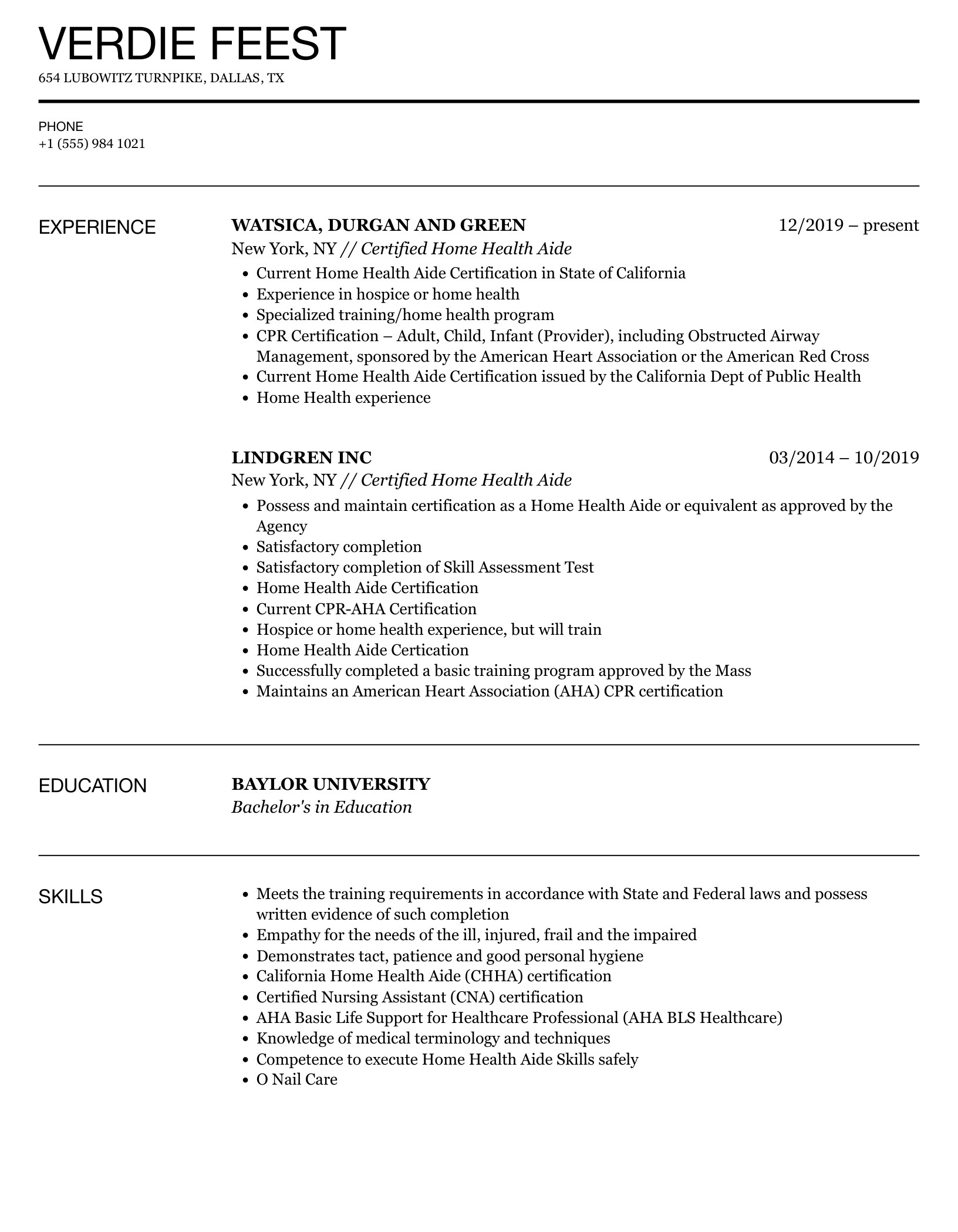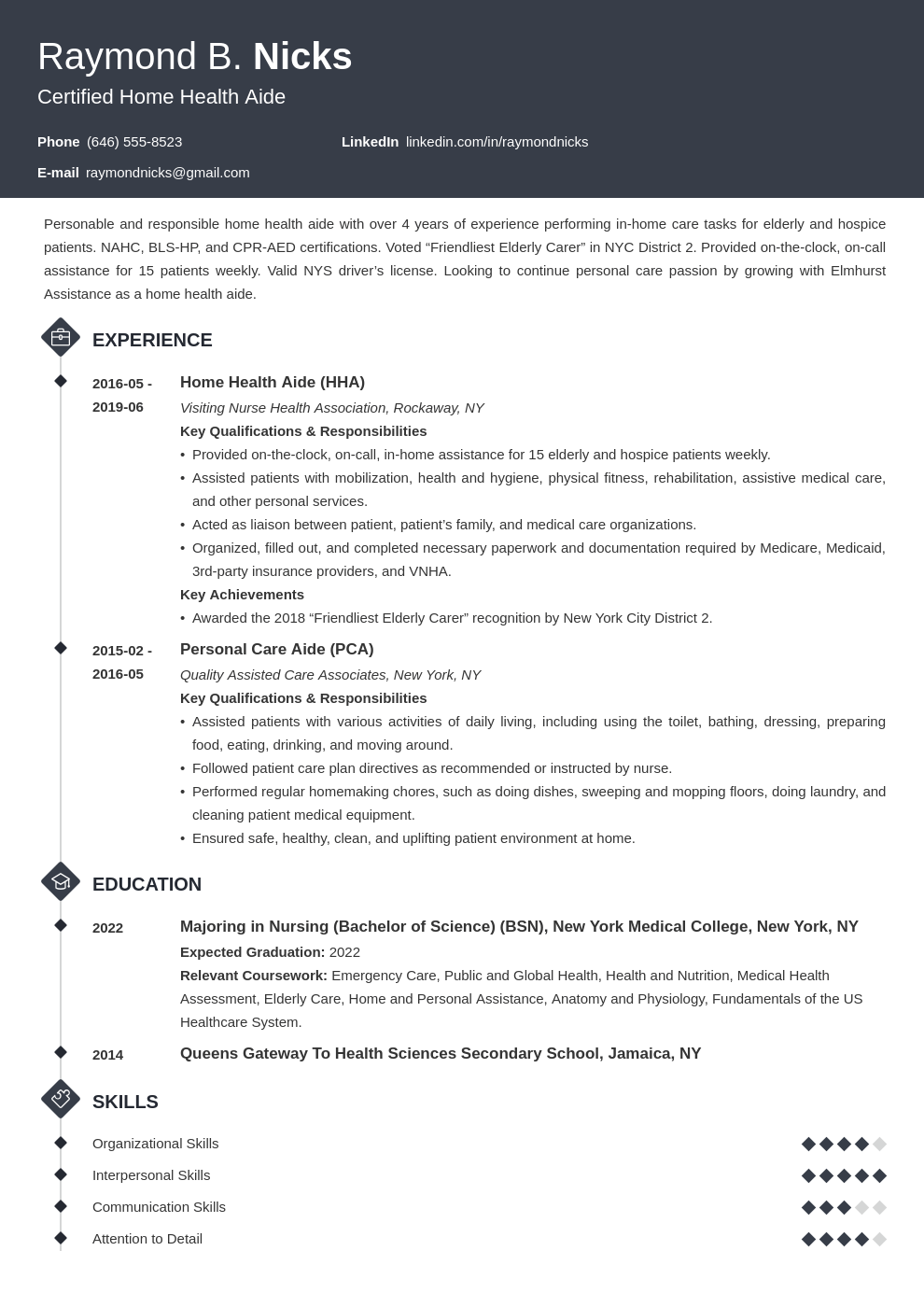What Is a Home Health Aide? A Career Guide
Table of Content
- How Long Does it Take to Become a Home Health Aide?
- Scope and standards of practice
- Pediatric Home Health Nursing
- What is the job outlook for home health aides?
- Bad breath or body odors on a home health aide will be least likely to be noticed by the?
- Home care
- What is the Difference Between an HHA, PHA & Caregiver?
- Home Health Aide Job Description, Duties, Salary, and More
Caregiving is a very demanding position, and as a home health aide, you'll be able to lighten the workload and burden that patients and their families experience. You'll be able to give them peace of mine and make a life-changing difference to people who need your help. A CNA works in organized healthcare settings and can't give medication.

If you’re thinking about working in this field, start by checking the requirements for becoming one in your state and then determine which training programs satisfy those requirements. Once you enroll in a program, you will learn about medical terminology, basic anatomy and physiology, proper nutrition, and how to take vital signs. Noncustodial health care involves medical or otherwise therapeutic care or intervention, as opposed to only helping with daily personal tasks. The federal government states that you must complete at least 16 hours of supervised training before being allowed to care for patients. If you decide to undergo training, it’s available from several institutions.
How Long Does it Take to Become a Home Health Aide?
Your chances at getting an HHA job are great if you've completed your training. The Bureau of Labor Statistics forecasts 34% growth in HHA jobs within the next 10 years. The agency may direct you to fill out an online application or you can drop one of along with your resume. If you don't hear anything from the agency within a few days, call them and ask about setting up an interview. Since you'll probably have a few patients a day, you'll need to manage your time well and be organized.

Offered by the State University of New York, helps you to learn the knowledge and skills to be an effective home aide worker. The course is designed for anyone who is interested in working as a home care assistant, or anyone who is already working with clients in their homes. That requires a degree of flexibility on your part and a willingness to adjust your schedule based on those needs.
Scope and standards of practice
The type of company or practice for which you work will also determine your hourly wage or salary compensation. The positions that require certification are typically those who receive Medicaid or Medicare reimbursement, and therefore must meet higher compliance standards that other companies. Even if you do not wish to work with one of these companies, certification is still advisable for liability issues, as well as stronger hire-ability for you. Home health aides are responsible for keeping track of the time allotted for each client's care and moving on to the next client accordingly.
The duties of home health aides vary based on the type of homecare setting and individual client needs. Home health nursing is a nursing specialty in which nurses provide multidimensional home care to patients of all ages. Home health care is a cost efficient way to deliver quality care in the convenience of the client's home. Home health nurses create care plans to achieve goals based on the client's diagnosis.
Pediatric Home Health Nursing
Home health workers are also not permitted to give out medication, do wound dressing changes, and other medical tasks without special certification and supervision by a healthcare professional. Home health aides are not nurses unless they have been certified and licensed appropriately. As a home health aide, you’ll typically work in patients’ homes, nursing homes, assisted living facilities, group homes, and may accompany patients to outpatient clinics. You might work during the day, or you may be needed at night, on weekends, or on holidays if you assist patients who need around-the-clock care.
Home health nursing is a unique field considering the obstacles faced by healthcare professionals. When out visiting clients, the nurse is alone and cannot rely on others most of the time. She established the Henry Street Settlement which served underprivileged individuals and families.
In addition, new methods of providing home health aide services, such as remote patient monitoring, will lead to job growth. The amount of experience needed is usually determined by the state government, but also can be determined by the employer as well. When starting a position as a home health aide, you will likely have to undergo criminal background check. Other common requirements include providing proof of citizenship or legal residence in the United States, and successfully complete any tests required by the state or employer. Helping your clients is at the heart of all of the tasks and duties you’ll perform during your career as a home health aide. Understanding everything that’s involved is an essential part of evaluating if this is the right job to pursue and if your strengths, skills, and interests align with what’s expected.

Patient is under the care of a doctor, and getting services under a plan of care established. If you're called for an interview, be detailed about what experience you gained during training. You'll probably need to give specific examples of care that you gave to someone in their home. As an HHA, you might be full-time, part-time, or on-call depending on what your patients need. Healthline has strict sourcing guidelines and relies on peer-reviewed studies, academic research institutions, and medical associations.
And many, if not most, states require home health aides to have regulated certifications that have been approved by the state to ensure that the healthcare being provided is up to health and industry standards. Sometimes, these home care workers may give medications, check a patient’s vital signs, or other similar tasks. This can only be done in certain states and must always be overseen by a nurse or other qualified and licensed healthcare practitioner. Let’s take a look at this question, and things like a home health aide job description and salary, to help you determine if this is the right career path for you.
CNAs may assist patients with more complex medical needs than home health aides. Becoming a home health aide can be your first step in a rewarding career. With more education and training, you may advance to become a personal care aide or a registered nurse. You may also decide to pursue managerial opportunities within your current organization or work for another firm that offers services to the elderly population. Your dedication and commitment will often be rewarded with opportunities for advancement.
Development of curricular materials that meet the New York State Education Department and New York State Department of Health standards is also covered in the guide. After initial approval, annual submission of materials is required to maintain operational approval. Some caregiver positions are more suitable to one person than another because of physical demands, or specific care instructions required. If you are interested in providing more medical services to your patients, you can consider becoming a certified nursing assistant . To become a CNA, you must complete at least 85 hours of training in a CNA-accredited state program.

A Home Health Aide assists patients with various tasks where they require help. They may include personal tasks, home maintenance tasks, or general companionship. This article was medically reviewed by Luba Lee, FNP-BC, MS and by wikiHow staff writer, Jessica Gibson. Luba Lee, FNP-BC is a Board-Certified Family Nurse Practitioner and educator in Tennessee with over a decade of clinical experience. Luba has certifications in Pediatric Advanced Life Support , Emergency Medicine, Advanced Cardiac Life Support , Team Building, and Critical Care Nursing. She received her Master of Science in Nursing from the University of Tennessee in 2006.
Not all homes are equipped to provide a clean environment for the client. Environmental issues in the home include unsanitary conditions that allow for bacterial growth and conditions that may increase the risk of falling for the client, such as poor lighting and area rugs. Education regarding this is important for the nurse to share with the client. Some Medigap plans pay for the coinsurance costs for Part B, which may help you pay for home health services.
This is because CNAs are often hired by clinics or private practices which might pay more than a home health care agency. Even though state requirements vary, federal guidelines require a minimum of 74 training hours. Half of HHAs do their training at local community colleges, although home health agencies also offer training.
Komentar
Posting Komentar